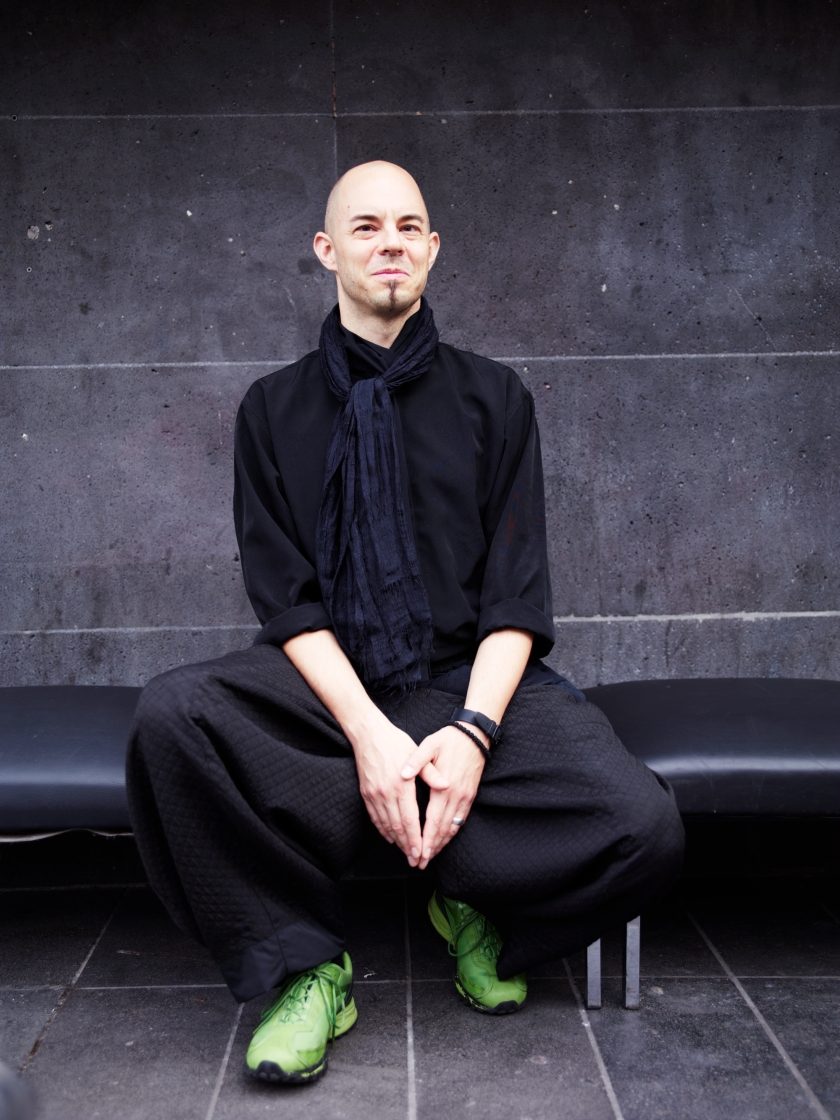Who or what inspired you to take up composing, and pursue a career in music?
My inner musician. It was a natural process. As a kid, I invented rhythms and melodies and my teachers supported this creativity – bless them. I also played rhythms on all sorts of things. Everything started with a small stream but then developed into a strong river, but the source was and is always there.
Who or what were the most significant influences on your musical life and career as a composer?
The simple fact of being welcome and supported as a child. At home, my mother gave my capacity for practical fantasy, probably the most important spin for my creative life. For example, once we were painting on the walls in my room fantastic birds and animals and created a lake with a big mirror and sand on the floor, since I was in a phase of liking primeval forests. We also brought trees into my room and hung all sorts of fruits onto them. A fantastic installation or composition! Later of course all the structural aspects of composing appeared in my life in contact with all sorts of arts and music. But also the physical, mental and spiritual training of the martial art Aikido strongly influences my thinking about kinetic discipline, structure and the freedom in it. As Igor Stravinsky said: through conscious restriction in your material you win a lot of freedom. So finally the balance between creativity and structure is essential and spiritual. An artist has too many ideas. The duty is to cultivate the essential ones
What have been the greatest challenges/frustrations of your career so far?
I was too slow to become a serious football player…
To develop a stable social and musical organism with a group of people over a long period of time can be challenging because of the focus on short-term profit. This infects us all. It is the worst strategy in human history and it destroys a lot of innovation, creativity and trust in ourselves. Before my grandfather died he said: “my capital is my experience”. I try to live with this motto
What are the special challenges/pleasures of working on a commissioned piece?
The circumstances: you need to clearly develop a sense of what might be possible. This not only needs musical skills but also a lot of social and organizational ones. To hear, share and co-develop your music with other people, you need to respect them and also give a lot.
What are the special challenges/pleasures of working with particular musicians, singers, ensembles and orchestras?
Long-term working relationships (for example, with my band) are essential in developing and supporting one’s own musical language. Every ensemble or orchestra has its own character: this is its strength and weakness at the same time. As a musician you always have respect for this – then you can create amazing results. I learned a lot about music when I accompanied singers in classical music and jazz/groove: your ear needs to hear faster then your shadow. I like to work with musicians who follow the basic musical principle: listen!, play only the essential, make everyone sound good.
Of which works are you most proud?
I never felt pride. But I think most of my work has dignity and sensuality.
How would you characterise your compositional language?
Its sensual groove reductionism, working modularly with patterns, cycles and overlapping. It is nourished by basic groove energies in combination with meditative flow and the conscious differentiation of classical chamber music. I call it RITUAL GROOVE MUSIC or simply ZENFUNK.
How do you work?
I always work. Creativity is a source. But when I finally work out a composition, I’m very focussed on it and dance around in my room or train with it to see if it works energetically. I need regular, sustainable and clear, repeated work structures like our weekly Monday meeting with a group, for example – and good Japanese green tea. The energy that is needed to just make focused working possible is often exhausting. That’s why I try to always have everything ready and in order to start whenever I like.
Who are your favourite musicians/composers?
First of all: my band mates Kaspar Rast, Sha, Thomy Jordi, Nicolas Stocker, Björn Meyer. They influenced me over the years very direct. I’ve played with drummer Kaspar Rast since we were kids.
The great old ones:
Classical composers: Bach, Bartók, Strawinsky, Morton Feldman, Ligeti.
Jazz pianists: Monk (reductionism in composing), Lennie Tristano (formal ideas), Ran Blake (abstraction), Joe Zawinul (non-pianistic phrasing concept), George Duke (pianistic phrasing).
Pop/Funk: Prince, Bill Withers, Meters, Laurie Anderson.
New stuff: Heiner Goebbels, Christian Wallumroed. Lots of ritual, spiritual and tribal music of the world.
As a musician, what is your definition of success?
Success is relative. I am more interested in resonance, inspiration and impact. A natural balance of giving and receiving inspiring energy from the different sources of life is essential.
What do you consider to be the most important ideas and concepts to impart to aspiring musicians?
LISTEN!
ONLY PLAY THE ESSENCE
MAKE EVERYONE SOUND GOOD
Where would you like to be in 10 years’ time?
Back to the future
What is your idea of perfect happiness?
Nobody is perfect
What is your most treasured possession?
Nothingness
What do you enjoy doing most?
Making music
What is your present state of mind?
Find your mind behind your monkey mind
Nik Bartsch’s new release AWASE is out now via ECM Records
Swiss pianist and composer Nik Bärtsch was born in 1971 in Zurich, where he still lives. He took piano and percussion lessons from the age of 8 and subsequently studied at the city’s Musikhochschule and university, simultaneously freelancing in diverse bands, “playing everything from fusion to free-funk, and all kinds of extroverted jazz”.
(photo by Mareike Foecking)
